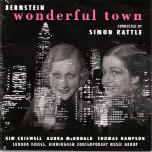Most musicals today are subjected to endless rewrites, tryouts, and more rewrites. When Leonard Bernstein and his lyricist cohorts Betty Comden and Adolph Green were called in to create from scratch a new score for Wonderful Town, they had one month before previews. And deliver the goods they did! It’s a bright score, packed to the rafters with jazzy numbers that haven’t lost one iota of their jazzy punch. Opera singers usually oversing Broadway roles, like Rodney Gilfry does as the Guide, First Editor, and Frank. Thomas Hampson, though, admirably scales down his instrument for “Quiet Girl”, and Audra McDonald’s Eileen is ravishing, secure, and involving. Imagine Rosalind Russell’s spunky Ruth channeled through someone who can really sing, and you’ve got Kim Criswell. She has a whacking good time growling her way through “One Hundred Easy Ways to Lose a Man”. The ensemble numbers have been studiously rehearsed, perhaps to a fault. Simon Rattle’s Birmingham forces swing well enough (their swaggering “Conga” is a case in point), but lack the rough and tumble edginess of the 1953 original cast recording. Broadway aficionados, though, will certainly want this release for its extra music, excellent notes, full texts, and vivid engineering.
































